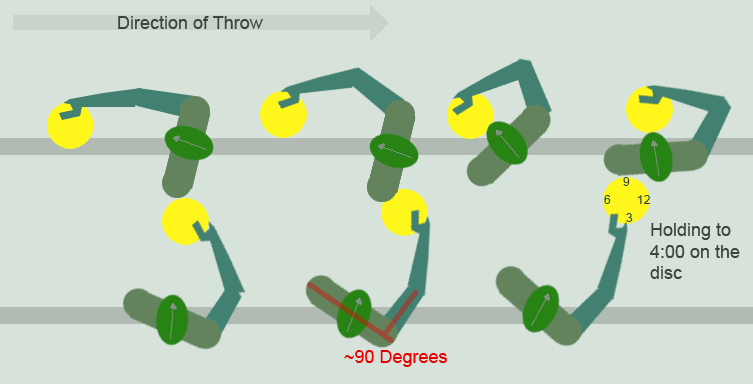Was trying to think of a good title about shoulders, and that led me to Jay-Z (... cause I'm straight with the Roc). By the way, who knew that Jay-Z played disc golf - let alone that he'd be a Roc fan?! Wonder if he throws old CE Rocs? Anyways, I've spent quite a bit of time thinking on shoulders and something started "hmmmm'ing" in my brain. To the video archive I went, to start going frame by frame to really figure this out.
I eventually grabbed a pen and paper and drew up a sketch and the cogs kept turning, then the paper turned into a mess and I went to the computer for some high-class photoshopping:
Looks pretty normal, but then something jumped out at me: notice how on the second line - the angle of the shoulders to the upper arm DECREASED? Did I just screw up the image?
No. The timing of the shoulders opening (turning to face the target), will actually be a part of where the power comes from.
Bear with me on this, because I believe it's one of the hidden secrets that rarely gets talked about, because honestly it's sneaky and not readily visible (and it happens really fast).
As you guide the disc to your center chest or even the right pec, the proper timing will have your shoulders aimed right along the line you're throwing on. As you start extending the disc forward, your shoulders are still coming though, catching up to a point where the upper arm is at a 90° from the shoulders.
At that point, you have a muscle base of shoulders/lats/triceps that are going to create a natural frame that will hold that position. MikeC below demonstrating what I'm talking about. Specifically, let's check out frame 5, 6,7, and 8 to see how much the shoulders open as the disc pretty much stays put.
The shoulders open, but the disc stays put... building up a natural constraint that gets loaded up full of potential energy. In screen shot 8, I put the discs in there to show the full power pocket - and in my mind, this answers a question I see all the time: what is the thing that allows you to throw faster?
For a very long time I was thinking that it must have been the bracing that delivering all the power, but while EXTREMELY important, there was something else going on because I was able to throw some long drives with no x-step and no real shifting (just good posture).
You hit an elasticity constraint when your upper arm is fighting to stay at 90 degrees, being compressed and then pushed open by the opening shoulders. The shoulders are driving the lever system open.
If you're right handed, reach back and feel your right lat (side back muscle) and then feel your left one. Right one is going to be more developed. We use that muscle to lock the arm into the 90° position, and swing that sucker open. I have quite a bit more "meat" on the right side.
Let me warn you: it's easy to over open. Over opening would be getting the shoulders open before that disc is at the center chest/right pec. Paul McBeth, above, keeps that upper body closed until that magic 90° angle is locked in, so that the opening will drive the full arm open. Open too soon, and you're going to drag the disc and lose the rigidity of the system that you need to take advantage of to get the goods.
Wanted to also tell you guys what's been up with me, personally. I resigned a job that I'd had for the last 8 years and took a new gig. It's been pretty difficult balancing the new job and then immediately contracting for the old job after hours, trying to play disc golf / field work and keep the kids on schedule for piano practice, classes, play dates and then of course doing my taxes. I do get quite a few emails from you awesome people, and lately it's been much harder to write back very quickly, so please be patient with me. If you're looking for specific form analysis, I strongly suggest DGCR as a fantastic resource of very wise players - and they even have a dedicated section for form review.
Things should hopefully settle down in the not-so-distant-future, but right now I'm barely keeping my head above water. But a blizzard just arrived in Denver, so it's okay - I was needing a forced rest anyways!



